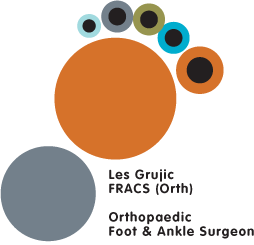POST-OPERATIVE INFORMATION
A post-operative appointment will have been made for you and a card with the date and time will be enclosed with the hospital paperwork sent from our office. The time of this appointment is planned at the optimal time for wound healing and also at a time when our physiotherapist (Jan) is in the rooms with Dr Grujic.
MEDICATIONS
You will be discharged with post-operative analgesia, however your GP can re-supply these medications if you run out before your post-operative visit with Dr Grujic. If you are allergic to any of these medications, please alert Dr Grujic and an alternative will be provided.
Please do not commence any non-prescription or any new prescription medications in the weeks after the surgery without first consulting Dr Grujic or your GP.
If you develop significant nausea, vomiting or light headedness, please see your GP for an alternative pain killer. Finally, please check with Dr Grujic before restarting arthritis or anti-inflammatory type medications after your surgery. If in doubt, please check with Dr Grujic.
MEDICAL CERTIFICATES
These can be obtained at your post-operative visit for yourself and/or your carer, if required. If you need a medical certificate before your first post-operative appointment then please call Gail or Penny who will be able to assist you with a certificate from the date of your surgery until the day after your first follow up appointment. This medical certificate can only be issued after your surgery, in case the operation is unexpectedly postponed or cancelled.
CAST CARE
Do not apply any weight through the cast unless advised by Dr Grujic or Jan (physio). To promote and encourage circulation, wiggle the toes in the cast, exercising the joints above the cast to promote circulation. At no point should you scratch underneath the plaster with any object to relieve itching as this may cause skin lacerations and subsequent infections. Never wet or wash a plaster unless advised by Jan. When bathing or showering, use a securely taped plastic bag or “seal tight” protector over your limb to ensure the cast does not get wet.
A dark discolouration can occur in your toes when the limb has been dependent (hanging down) for some time. This is normal if the sensation is normal in your toes. We recommend you elevate your leg and the colour should return to normal quite rapidly.
Please contact Gail or Penny on +61 2 9904 6195 immediately, alternatively, please call or attend your local GP or hospital should any of the following occur:
• Marked blueness or whiteness in your toes, with altered sensation.
• Burning or severe pain under the plaster.
• Numbness or pins and needles in your toes.
• Increasing swelling.
• Feeling of rubbing or a gravel like sensation under the cast.
• Rubbing of the cast material on the skin
• If the cast becomes loose or cracked
• If there is increasing pain around the wound site or if you develop a fever
• If there is any offensive odour coming from under the cast
DRIVING
Dr Grujic advises all patients undergoing surgery to avoid driving until you are no longer wearing a cast or a boot and until the lower limb in question can be used normally to operate the break and the clutch without undue hesitation, discomfort or weakness.


